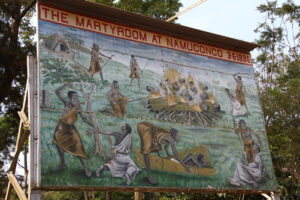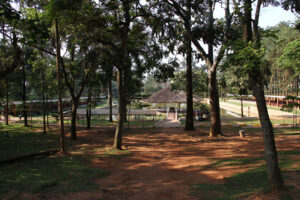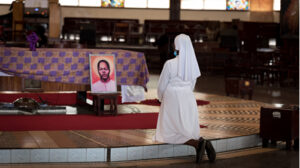The Uganda Martyrs Catholic shrine in Namugongo is located about 15km North East of the Kampala City center in Kiira Municipality, Wakiso district. The Uganda Martyrs Shrine in Namugongo is one of the most visited religious sites in Africa. Each 3rd of June, over 1 million pilgrims visit the shrine. The construction and later dedication of the Uganda Martyrs Catholic shrine was inspired by earlier events that took place during the late 19thcentury when Christian missionaries first came to Buganda kingdom to spread Christianity.
 On settling in Buganda, the Missionaries went ahead and set up missionary stations from where they preached the gospel of Christ. This saw many people converting to Christianity and getting baptized hence abandoning their traditional customs. The Kabaka (King) of Buganda Mwanga saw Christianity as a threat to his kingdom and rule. He threatened those who were spreading Christianity and ordered them to stop or face execution. He also ordered converts to abandon their faith and stick with the traditional religion. Some of his pages who had already converted to Christianity declined to abandon their faith which infuriated the king. He decided to sentence them to death. The Martyrs were then marched to the execution ground in Namugongo. A total of 22 Roman Catholic martyrs and 23 Anglicans were killed between 1885 to 1887. 12 Roman Catholic Martyrs were burnt to death in Namugongo on the 3rd of June 1886 while others were killed in different locations along the way to Namugongo. You can read more about the Munyonyo Martyrs Shrine.
On settling in Buganda, the Missionaries went ahead and set up missionary stations from where they preached the gospel of Christ. This saw many people converting to Christianity and getting baptized hence abandoning their traditional customs. The Kabaka (King) of Buganda Mwanga saw Christianity as a threat to his kingdom and rule. He threatened those who were spreading Christianity and ordered them to stop or face execution. He also ordered converts to abandon their faith and stick with the traditional religion. Some of his pages who had already converted to Christianity declined to abandon their faith which infuriated the king. He decided to sentence them to death. The Martyrs were then marched to the execution ground in Namugongo. A total of 22 Roman Catholic martyrs and 23 Anglicans were killed between 1885 to 1887. 12 Roman Catholic Martyrs were burnt to death in Namugongo on the 3rd of June 1886 while others were killed in different locations along the way to Namugongo. You can read more about the Munyonyo Martyrs Shrine.
The Uganda Martyrs Shrine in Namugongo
49 years after the Namugongo holocaust (In the year of 1935), the Mill Hill missionaries set up a Catholic parish in the same spot were Charles Lwanga and companions were burnt to death. The Uganda Martyrs were  beautified on the 6th of June 1920 by Pope Benedict XV. They were canonized as saints on the 8th of October 1964 by Pope Paul VI at the St Peters Basilica of Rome. Pope Paul VI visited the Namugongo Martyrs Shrine to honor the martyrs later in 1969. This was also the first time that a Pope visited Africa. The construction of the Uganda Martyrs shrine had already begun and was completed in 1964, just in time for the canonization of the Martyrs. The construction project was implemented by Roko Construction and the Architect behind the unique mini basilica was Dr. Danhinden. Cardinal Nsubuga and other clergy oversaw the completion of the project.
beautified on the 6th of June 1920 by Pope Benedict XV. They were canonized as saints on the 8th of October 1964 by Pope Paul VI at the St Peters Basilica of Rome. Pope Paul VI visited the Namugongo Martyrs Shrine to honor the martyrs later in 1969. This was also the first time that a Pope visited Africa. The construction of the Uganda Martyrs shrine had already begun and was completed in 1964, just in time for the canonization of the Martyrs. The construction project was implemented by Roko Construction and the Architect behind the unique mini basilica was Dr. Danhinden. Cardinal Nsubuga and other clergy oversaw the completion of the project.
Once the Shrine was completed, it was officially opened to the public by an envoy to the Pope, his Eminence Sergio Cardinal Pignedoli on 3rd June 1964. June 3rd became the official day of celebrating the Uganda Martyrs. In 1993, Pope John Paul II made a visit to the Martyrs Shrine in Namugongo after which he elevated the status of the shrine to a mini basilica. The basilica stands tall today with its unique  architectural design that looks like a traditional African hut in a circular shape. The basilica has got a seating capacity of about 1000 people with other distinctive architectural details on both the interiors and exteriors. For example, there are 22 copper pillars that measure about 100 feet long among other things. A lake was excavated right in the middle of the gardens of the mini basilica in honor of the martyrs. Pilgrims draw water from this lake as it is believed to contain holy water which has the power to cure diseases. Also right in the middle of the lake is a pavilion from which the main celebrant and about 300 other bishops and priests sit during major celebrations like the Martyrs day and other important functions. From the pavilion in the middle of the lake, one can view the entire surroundings of the basilica from all angles. The Uganda Martyrs shrine in Namugongo is not only a pilgrimage center but also a tourist attraction site in Uganda with so many things to see and stories to hear.
architectural design that looks like a traditional African hut in a circular shape. The basilica has got a seating capacity of about 1000 people with other distinctive architectural details on both the interiors and exteriors. For example, there are 22 copper pillars that measure about 100 feet long among other things. A lake was excavated right in the middle of the gardens of the mini basilica in honor of the martyrs. Pilgrims draw water from this lake as it is believed to contain holy water which has the power to cure diseases. Also right in the middle of the lake is a pavilion from which the main celebrant and about 300 other bishops and priests sit during major celebrations like the Martyrs day and other important functions. From the pavilion in the middle of the lake, one can view the entire surroundings of the basilica from all angles. The Uganda Martyrs shrine in Namugongo is not only a pilgrimage center but also a tourist attraction site in Uganda with so many things to see and stories to hear.

